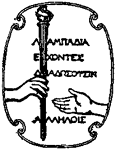Transcriber's Note:
Inconsistent hyphenation in the original document has been preserved.
Obvious typographical errors have been corrected.For a complete list, please see the end of this document.
DREAMERS OF
THE GHETTO
By I. ZANGWILL, Author of
"Children of the Ghetto" "The
Master" "The King of Schnorrers"

HARPER & BROTHERS PUBLISHERS
NEW YORK AND LONDON
1898
BY THE SAME AUTHOR.
THE MASTER. A Novel. Illustrated by T. de Thulstrup.Post 8vo, Cloth, Ornamental, $1 75.
He who begins "The Master" will find a charm which will lure himthrough adventures which are lifelike and full of humaninterest.... A strong and an enduring book.—Chicago Tribune.
To those who do not know his splendid imagery, keen dissectionof character, subtle views of humor, and enthralling power ofnarration, this work of Mr. Zangwill's should prove momentousand important.—Boston Traveller.
"The Master" is the best novel of the year.—Daily Chronicle,London.
NEW YORK AND LONDON:
HARPER & BROTHERS, PUBLISHERS.
Copyright, 1898, by I. Zangwill.
Copyright, 1898, by Harper & Brothers.
All rights reserved.
PREFACEToC
This is a Chronicle of Dreamers, who have arisen in the Ghetto fromits establishment in the sixteenth century to its slow breaking-up inour own day. Some have become historic in Jewry, others havepenetrated to the ken of the greater world and afforded models toillustrious artists in letters, and but for the exigencies of my themeand the faint hope of throwing some new light upon them, I should nothave ventured to treat them afresh; the rest are personally known tome or are, like "Joseph the Dreamer," the artistic typification ofmany souls through which the great Ghetto dream has passed. Artistictruth is for me literally the highest truth: art may seize the essenceof persons and movements no less truly, and certainly far morevitally, than a scientific generalization unifies a chaos ofphenomena. Time and Space are only the conditions through whichspiritual facts straggle. Hence I have here and there permitted myselfliberties with these categories. Have I, for instance, misplaced themoment of Spinoza's obscure love-episode—I have only followed his ownprinciple, to see things sub specie æternitatis, and even were hislatest Dutch editor correct in denying the episode altogether, Ishould still hold it true as summarizing the emotions with which eventhe philosopher must reckon. Of Heine I have attempted a sort ofcomposite conversation-photograph, blending, too, the real heroine ofthe little episode with "La Mouche." His own words will be recognizedby all students of him—I can only hope the joins with mine are nottoo obvious. My other sources, too, lie sometimes as plainly on thesurface, bu